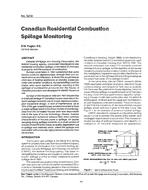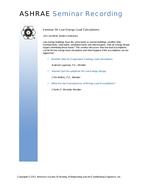Click here to purchase
Indoor temperature, relative humidity, particulate matter, volatile organic compounds, and carbon dioxide (CO2) concentrations were monitoredcontinuously in the breathing zone of some 150 Finnish office buildings (average five rooms per building). For this study focusing on ventilation, weselected those 35 buildings that had data from at least six months in both 2016 and 2017. Daily outdoor air ventilation rates in each room wereestimated based on the steady state / peak CO2 approach for each day when the difference between maximum and minimum CO2 concentration was >100 ppm. In addition, we modelled relative work performance based on the daily ventilation rates. On the building level, estimated mean ventilation rates(SD) ranged from 18.4 (20.3) to 65.8 (21.6) l/s?person. Temporal variations were seen by year, month and weekday, which could be partiallyexplained by occupancy patterns and outdoor temperatures. Estimated work performance was high as compared to 6.5 l/s·person, which exceeds theminimum required ventilation rate in Finland. Thus, improving performance by increasing ventilation rates would be limited in this sample. Buildingowners/operators can access the monitoring results, including CO2 concentrations, almost real-time using a web-based platform, which provides them anopportunity to use these data to improve environments cost-effectively. Platforms processing raw data into estimates and, moreover, suggestions or actionplans, could be beneficial.
Citation: 2019 Winter Conference, Atlanta, GA, Conference Papers
Product Details
- Published:
- 2019
- Number of Pages:
- 6
- Units of Measure:
- Dual
- File Size:
- 1 file , 1 MB
- Product Code(s):
- D-AT-19-C024


